AI unleashed – Economic realities beyond the hype
Livestream
Gallery

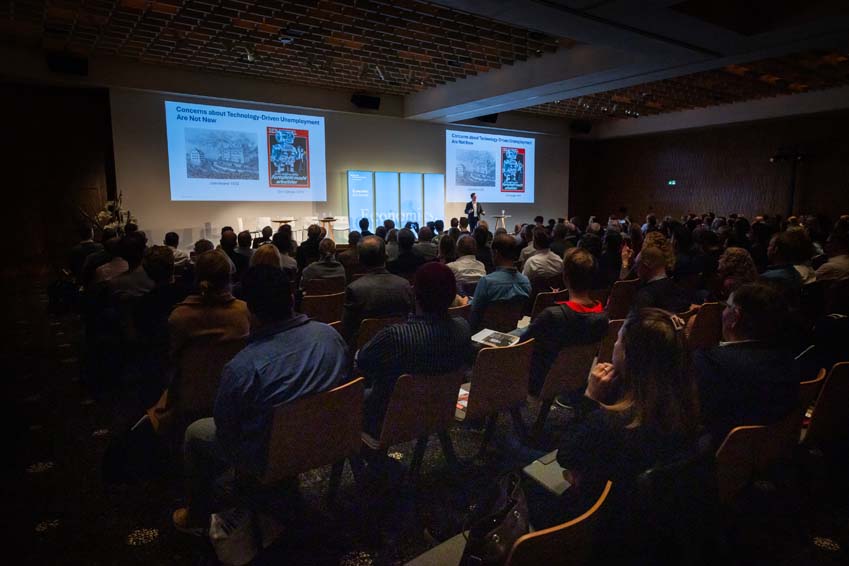


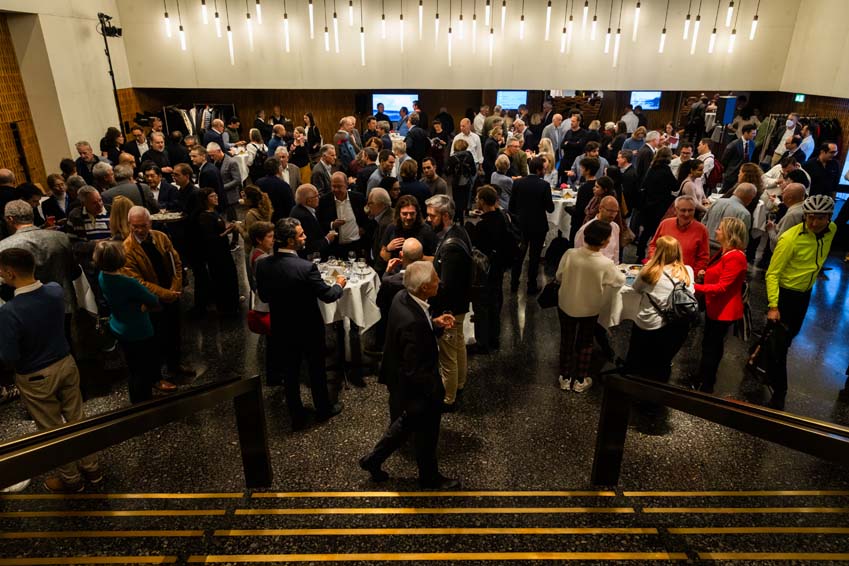
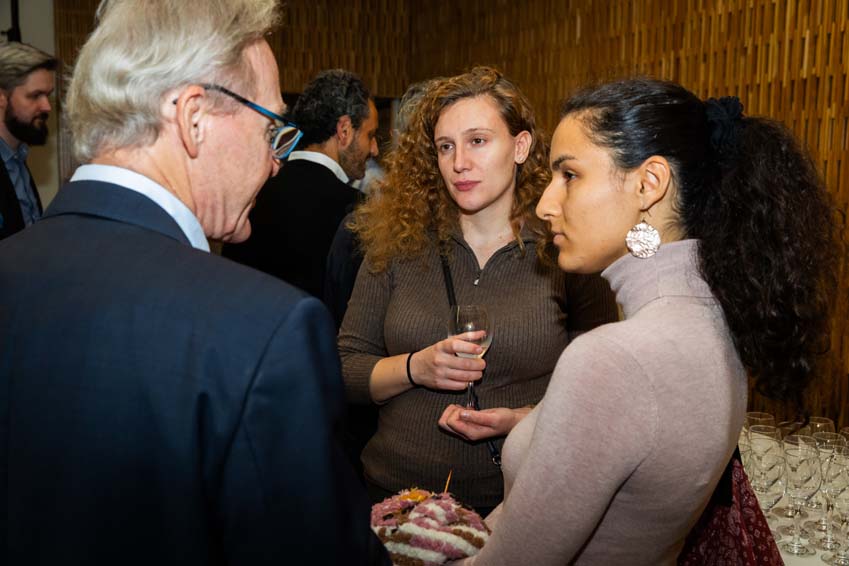
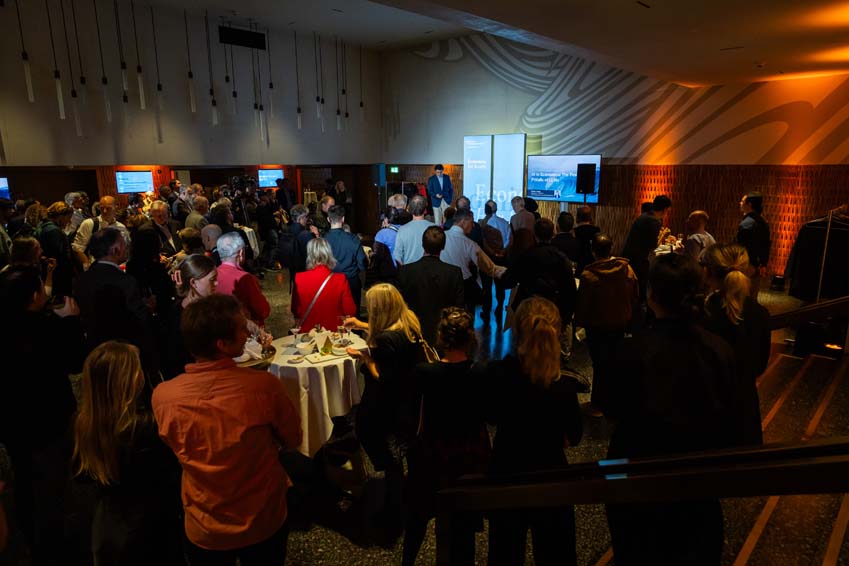

Thought Supply
Summary
On October 31, 2024, the UBS Center Forum for Economic Dialogue gathered a significant audience to hear insights from leading experts on the role of AI in our society. Despite intense discussions about the risks and misuse of AI, the overall assessment of the new technology was positive. With the right foundations in place, AI holds immense potential to drive innovation, increase prosperity, and reduce inequality.
Read our summary
On October 31, 2024, the UBS Center Forum for Economic Dialogue gathered a significant audience to hear insights from leading experts on the role of AI in our society. Despite intense discussions about the risks and misuse of AI, the overall assessment of the new technology was positive. With the right foundations in place, AI holds immense potential to drive innovation, increase prosperity, and reduce inequality.
Read our summary
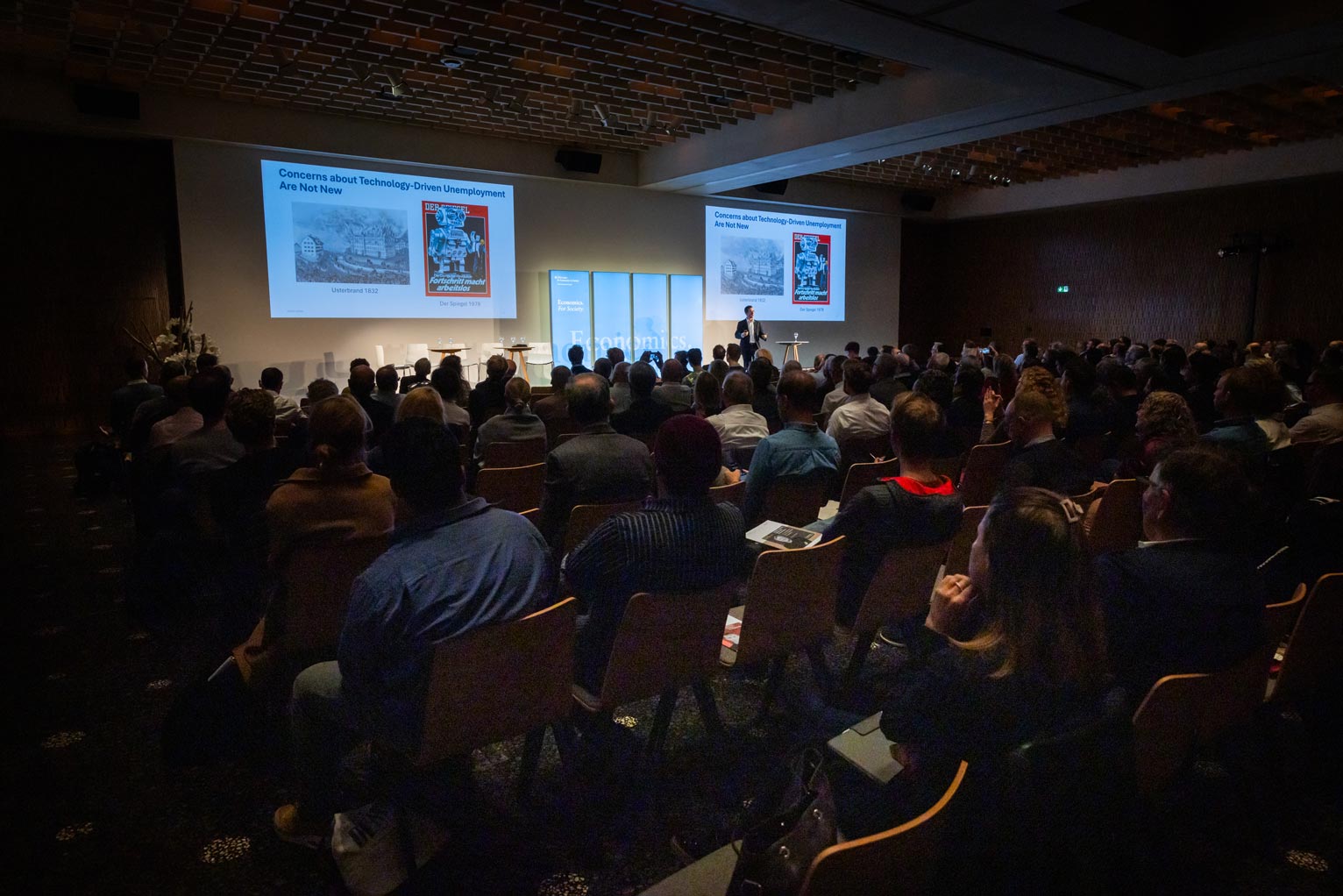
Speakers
Christine Antlanger-Winter has been Country Director Google Switzerland since 2023. Before, she held the same position for Google Austria from 2018 until 2023. Prior to this, she was CEO of the media agency Mindshare where she built and was responsible for the digital agendas since 2003. She graduated from Hagenberg University of Applied Sciences with a degree in media technology and design. She was President of IAB Austria and has been Secretary-General of IAA Austria since 2018.
Valerio Capraro is an Associate Professor at the University of Milano-Bicocca. He combines human experiments, mathematical modelling, and numerical simulations to shed light on human behaviour. His work has been published in leading academic journals, including Nature, Nature Human Behaviour, PNAS, Journal of Economic Literature, and Journal of Personality and Social Psychology. His book "The economics of language: How large language models can reshape behavioural economics" is forthcoming by Cambridge University Press.
Lorenzo Maria Casale is a PhD student in Economics at the University of Zurich. Born and raised in Rome, he holds a Bachelor’s and Master’s degree in Economics from Tor Vergata University. He joined the Zurich Graduate School of Economics at the University of Zurich in 2022 after completing a 2-year pre-doctoral program in the same department with UBS Foundation Professor Hans-Joachim Voth and Prof. Bruno Caprettini. Lorenzo’s research sits at the intersection of political economy and cultural economics, investigating how identity signals and expressive behavior shape political and economic outcomes. He combines causal inference with machine learning methods to study social coordination.
Gregory Crawford is a Professor of Economics at the University of Zurich, specializing in the fields of industrial organization, antitrust and competition policy, and media economics. His research interests include antitrust and regulation, digital platforms, vertical integration and foreclosure, bargaining, public-service broadcasting, advertising, and empirical methods for analyzing these topics. In 2007 and 2008, he was Chief Economist at the Federal Communication Commission. Greg was co-Director of the Industrial Organization Programme at the Centre for Economic Policy Research from 2014 to 2022. He is the co-founder and was the first director of the CEPR Research and Policy Network on Competition Policy. He joined Zalando in 2022 as their inaugural Chief Economist to expand the role of economics and economists in their business.
David Dorn is the UBS Foundation Professor of Globalization and Labor Markets at the University of Zurich and the director of the university-wide interdisciplinary research priority program “Equality of Opportunity.” He was previously a tenured associate professor at CEMFI in Madrid, a visiting professor at the University of California in Berkeley, and a visiting professor at Harvard University.Professor Dorn’s research spans the fields of labor economics, international trade, economic geography, macroeconomics, and political economy. He published influential studies on the impacts of globalization and technological innovation on labor markets and society. David Dorn is among the 100 most highly cited economists worldwide in the last decade. In 2023, he was awarded the Hermann Heinrich Gossen Prize for the most accomplished economist in German-speaking countries under the age of 45.
Catrin Hinkel serves as CEO Microsoft Switzerland. She assumed the role in May 2021. Having spent more than 25 years in the tech industry across a variety of organizations and diverse cultures, Hinkel champions technology development as a solution to many challenges in the world, innovation as well as sustainability. Prior to joining Microsoft, Hinkel held notable roles at Accenture, most recently as Senior Managing Director, Europe Cloud First Strategy & Consulting Lead. Hinkel is a member of the Executive Committee of Digital Switzerland, the ASUT Industry Association Board and the Supervisory Board of the CISPA Helmholtz Center for Information Security. Alongside these roles, she is also a spokesperson for the Board of “Generation CEO”, a non-profit association and established network for women leaders in German-speaking countries. Hinkel holds a Bachelor of Arts from the University of Reutlingen (European Business School Reutlingen and London). She is also recognized for her commitment to digital innovation, including being named one of Switzerland’s Digital Shapers 2022 by Swiss Bilanz magazine and as one of the Top 100 by Women in Business magazine.
Rafael Lalive holds a position as a professor in economics at University of Lausanne since September 2006. His main research interests are twofold. On one hand, he works on the economic effects of reforms to public policy. Specifically, his research has focused on the effectiveness of active labor market programs in helping job seekers find jobs, on the role of financial incentives in unemployment insurance, on the effects of parental leave policies on fertility and return to work of mother of newborn children, on policies for disabled individuals and on the effects of environmental policies. On the other hand, he is interested in social economics, i.e. the importance of social interactions for education decisions and the role of social learning. His research has been published by major journals in economics such as the Quarterly Journal of Economics, the Review of Economic Studies, the Journal of the European Economic Association, the Review of Economics and Statistics and also general science journals such as Science or PLOSone. He is a fellow of the Institute for the Study of Labor in Bonn (IZA) and an affiliate of CEPR and IFAU. Rafael Lalive earned a PhD in labor economics from University of Zurich in 20021, and was an invited scholar at the Center for Labor Economics at UC Berkeley in 2014 and at Tinbergen Institute in Amsterdam in the academic year 2002 to 2003. He advised the Swiss government on Covid-19 in 2020 and 2021.
Sendhil Mullainathan is one of the economists who not only study AI, but both apply it in their own research and study how to advance the underlying technology. He holds the first joint appointment between the MIT Economics and Computer Science Departments where he is the Peter de Florez Professor. He has in the past worked on a variety of areas including behavioral economics, poverty, discrimination, and finance. Mullainathan recently co-authored Scarcity: Why Having too Little Means so Much and writes regularly for the New York Times. Mullainathan is a recipient of the MacArthur “Genius Grant.” He has been designated a “Young Global Leader” by the World Economic Forum, was labeled a “Top 100 Thinker” by Foreign Policy Magazine, and was named to the “Smart List: 50 people who will change the world” by Wired Magazine (UK).
Jan Egbert Sturm is Professor of Applied Macroeconomics, Director of the KOF Swiss Economic Institute at ETH Zurich, Editor of the European Journal of Political Economy, and a member of several advisory committees in Switzerland and abroad. His research relies heavily on empirical methods and statistics, focusing on monetary economics, macroeconomics, and political economy, with a particular interest in areas closely related to practical and topical issues.
Ana Maria Montero is an international broadcast journalist with 20 years of on camera experience who grew up professionally within the CNN family - from intern to anchor desk – working for CNN International, CNN Español, CNN, and HLN, in English and Spanish. In 2017 she joined the CNNMoney Switzerland team as an anchor for their flagship business and finance show, The Swiss Pulse, and the host of the long-format interview shows, The Newsmaker as well as the innovation-driven Tech Talk, and All Inclusive, focused on SDG topics. At present, she independently hosts and moderates a wide range of live and virtual events and content for a diverse list of Swiss and international clients ranging from the finance and technology sectors to sustainability, diversity and luxury, among others. The pursuit of her own story brought this Cuban, Spanish, American to Zurich, where she lives with her family, and obsesses about making the world a better place for her girls.
Christine Antlanger-Winter has been Country Director Google Switzerland since 2023. Before, she held the same position for Google Austria from 2018 until 2023. Prior to this, she was CEO of the media agency Mindshare where she built and was responsible for the digital agendas since 2003. She graduated from Hagenberg University of Applied Sciences with a degree in media technology and design. She was President of IAB Austria and has been Secretary-General of IAA Austria since 2018.
Valerio Capraro is an Associate Professor at the University of Milano-Bicocca. He combines human experiments, mathematical modelling, and numerical simulations to shed light on human behaviour. His work has been published in leading academic journals, including Nature, Nature Human Behaviour, PNAS, Journal of Economic Literature, and Journal of Personality and Social Psychology. His book "The economics of language: How large language models can reshape behavioural economics" is forthcoming by Cambridge University Press.
Lorenzo Maria Casale is a PhD student in Economics at the University of Zurich. Born and raised in Rome, he holds a Bachelor’s and Master’s degree in Economics from Tor Vergata University. He joined the Zurich Graduate School of Economics at the University of Zurich in 2022 after completing a 2-year pre-doctoral program in the same department with UBS Foundation Professor Hans-Joachim Voth and Prof. Bruno Caprettini. Lorenzo’s research sits at the intersection of political economy and cultural economics, investigating how identity signals and expressive behavior shape political and economic outcomes. He combines causal inference with machine learning methods to study social coordination.
Gregory Crawford is a Professor of Economics at the University of Zurich, specializing in the fields of industrial organization, antitrust and competition policy, and media economics. His research interests include antitrust and regulation, digital platforms, vertical integration and foreclosure, bargaining, public-service broadcasting, advertising, and empirical methods for analyzing these topics. In 2007 and 2008, he was Chief Economist at the Federal Communication Commission. Greg was co-Director of the Industrial Organization Programme at the Centre for Economic Policy Research from 2014 to 2022. He is the co-founder and was the first director of the CEPR Research and Policy Network on Competition Policy. He joined Zalando in 2022 as their inaugural Chief Economist to expand the role of economics and economists in their business.
Outline
At our Forum for Economic Dialogue we uncovered the impact of artificial intelligence (AI) on economics. There are numerous concerns regarding the application of AI. However, the hopes placed in AI are just as significant. Our event aimed to look beyond the hype surrounding AI and move away from theoretical debates, such as the takeover of world domination by machines, and instead focus on the facts. How is AI promoting economic growth and who will benefit most from it? Does AI have the potential to increase prosperity and reduce inequalities? What role will practical applications of AI play in shaping business strategies and/or economic policies? What are the long-term economic implications of AI-driven automation for global labor markets? We appreciated the lively discussions and engaging exchange.
This was a public on-site event with free access via livestream on our website in association with the Centre for Economic Policy Research (CEPR).
At our Forum for Economic Dialogue we uncovered the impact of artificial intelligence (AI) on economics. There are numerous concerns regarding the application of AI. However, the hopes placed in AI are just as significant. Our event aimed to look beyond the hype surrounding AI and move away from theoretical debates, such as the takeover of world domination by machines, and instead focus on the facts. How is AI promoting economic growth and who will benefit most from it? Does AI have the potential to increase prosperity and reduce inequalities? What role will practical applications of AI play in shaping business strategies and/or economic policies? What are the long-term economic implications of AI-driven automation for global labor markets? We appreciated the lively discussions and engaging exchange.
This was a public on-site event with free access via livestream on our website in association with the Centre for Economic Policy Research (CEPR).
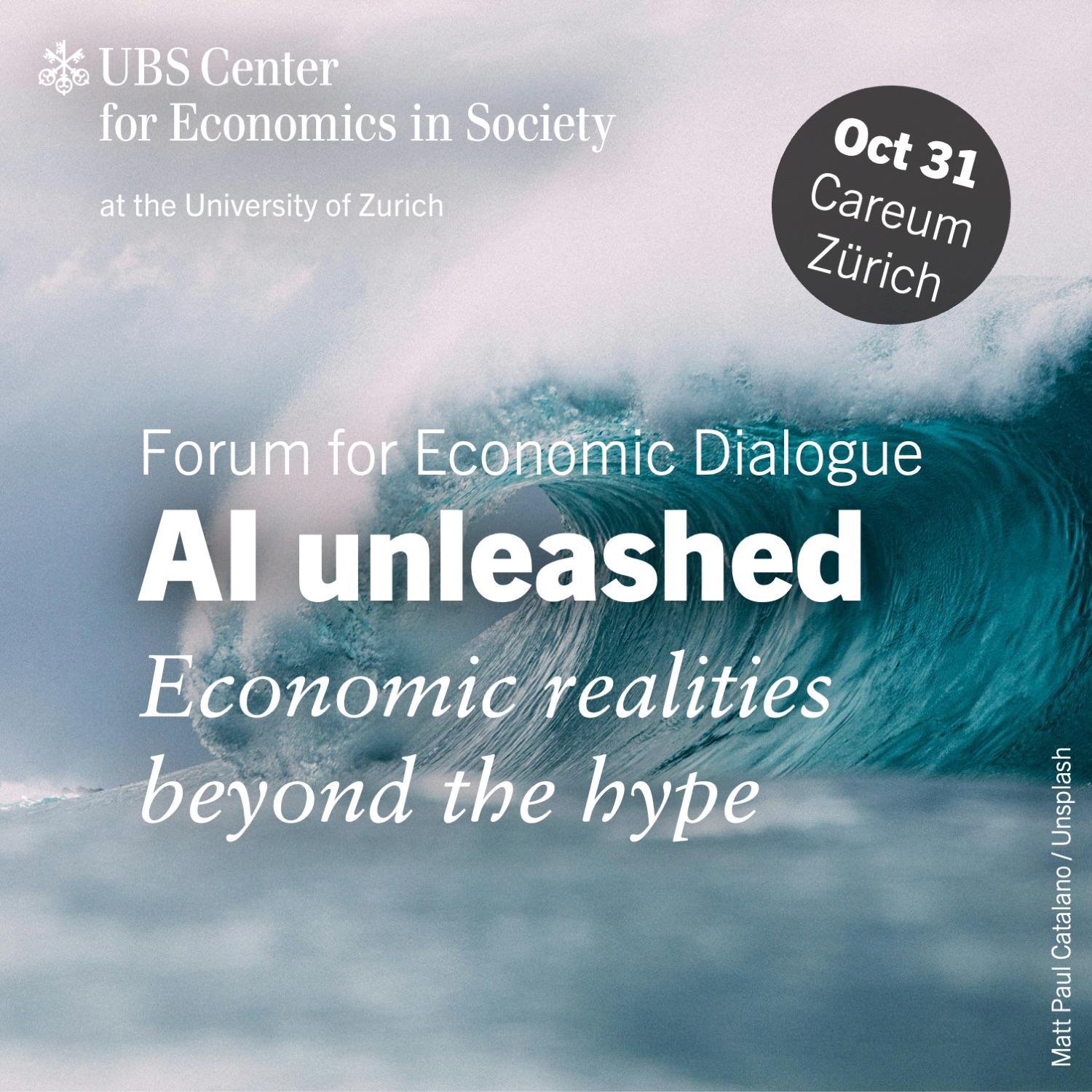
Program
| 15.00 |
Door opening |
| Part I |
Navigating the future: AI’s role in the economy |
| 15.30 |
Zurich Lecture of Economics in Society Sendhil Mullainathan (MIT) |
| 16.00 |
Panel discussion Gregory Crawford (UZH/Zalando) Catrin Hinkel (Microsoft Switzerland) Sendhil Mullainathan (MIT) Moderation: Ana Maria Montero |
| 17.00 |
Coffee break |
| Part II |
Unemployment and labor markets: disruptions from AI? |
| 17.30 |
Keynote speech David Dorn (UZH) |
| 18.00 |
Panel discussion Christine Antlanger-Winter (Google Switzerland) Valerio Capraro (University of Milano-Bicocca) David Dorn (UZH) Jan-Egbert Sturm (ETH) Moderation: Ana Maria Montero |
| 19.00 |
Research Slam and cocktail reception Valerio Capraro (University of Milano-Bicocca) Lorenzo Maria Casale (UZH) Philipp Zhang (UZH) Rafael Lalive (Université de Lausanne) Moderation: Ana Maria Montero |
| 20.00 |
End of event |
| 15.00 |
Door opening |
| Part I |
Navigating the future: AI’s role in the economy |
| 15.30 |
Zurich Lecture of Economics in Society Sendhil Mullainathan (MIT) |
| 16.00 |
Panel discussion Gregory Crawford (UZH/Zalando) Catrin Hinkel (Microsoft Switzerland) Sendhil Mullainathan (MIT) Moderation: Ana Maria Montero |
| 17.00 |
Coffee break |
| Part II |
Unemployment and labor markets: disruptions from AI? |
| 17.30 |
Keynote speech David Dorn (UZH) |
| 18.00 |
Panel discussion Christine Antlanger-Winter (Google Switzerland) Valerio Capraro (University of Milano-Bicocca) David Dorn (UZH) Jan-Egbert Sturm (ETH) Moderation: Ana Maria Montero |
| 19.00 |
Research Slam and cocktail reception Valerio Capraro (University of Milano-Bicocca) Lorenzo Maria Casale (UZH) Philipp Zhang (UZH) Rafael Lalive (Université de Lausanne) Moderation: Ana Maria Montero |
| 20.00 |
End of event |
